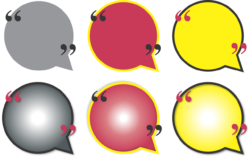
I can’t remember what I did yesterday, but I can remember exactly where I was sitting at a Redwood Writers (CA) workshop when I learned that some writers do not use quotations around dialogue. Actually, at this time one author was mentioned, whom I had not heard of. I think this particular author used a hyphen or short dash at the beginning of lines of dialogue. I thought, “Oh, the horror!” And life went on . . .
Several months ago, I read The Lincoln Highway by Amor Towles. Excellent book. But I noticed there were no quotation marks to indicate dialogue. This was the first time I noticed I was reading something without quotation marks to indicate dialogue. I don’t think there were dashes either. Just — nothing.
Nonetheless I could read the book easily, and the lack of quotation marks did not bother me at all. Actually, it felt rather freeing not to have all those little marks in there. Shortly after I finished reading it, I spoke to a friend who was in the process of reading it. She didn’t even notice it had no quotation marks to indicate dialogue. At the time I figured it was because she was not involved in writing or publishing.
When I was researching this post, I discovered that there are many books that don’t use quotation marks for dialogue — some of which I have read without ever noticing. And a few of them I read recently.
Some of the more famous authors who don’t use quotation marks for dialogue are Samuel Beckett, Cormac McCarthy, E.L. Doctorow, and the forefather of this style, James Joyce (whom I read a while ago and choose to forget about).
A few of the books I have read and never noticed they were “quoteless” are Normal People by Sally Rooney, Groundskeeping by Lee Cole, and Girl, Woman, Other by Bernadine Evaristo (all of which I liked).
In the beginning, 1st-century scribes used the diple (>) to indicate a line containing noteworthy text. After the invention of the printing press, compositors used a pair of commas – or hanging commas – to indicate quoted text. Quotes have been in print since the 16th century.
However, not all countries and languages use the double quotes for dialogue. In the United Kingdom single quotes are used, with double quotes used for quotes inside of quotes — exactly the opposite of how we in America do it. In France it is customary to use dashes.
So, why not use quotation marks to indicate dialogue? Most authors (including me) still do.
- Some say eliminating the quotes is more elegant and actually easier for readers.
- Lack of quotation marks blurs the line between dialogue and description, allowing readers to insert more of their own interpretation.
- If you write well, the reader should be able to easily tell the difference between text and dialogue.
- The page looks cleaner without all the little marks.
However, if not done correctly, the lack of quotation marks can be a problem.
- It can be annoying to the reader trying to figure out who is saying what.
- It is not the reader’s job to determine what is dialogue and what isn’t.
- Therefore, some readers might just give up.
…And then there is e.e.cummings and his lack of capital letters. But that’s another thing entirely . . .



Night Watch by Jayne Anne Phillips does not use quotes in a book full of conversation. It won the Pulitzer Prize for fiction in 2024.
Thanks for the info. I don’t know that book.
Currently, I’m reading Cold Mountain by Charles Frazier, and in the book, the author has wonderfully shown us how we can write without using quotation marks, and I didn’t have any difficulty in making out who the character was. According to my tactic, if you write one person’s dialogue and then space (Writing on computer) to write the dialogue of the next person in the other line, then I think you can definitely go with the idea! (If there’s any mistake in my opinion, I’m sorry. I am just a fourteen year old writer, writing my own novel)
Thank you so much for your comment and opinion. Your opinion is as good as any of ours! And good luck with your novel!
I recently attempted to read Love by Roddy Doyle. Couldn’t do it. I was able to read The Lincoln Highway. I have not read the Outlander books. Some writers make it work, some don’t – at least for me.
I haven’t read Love, but I guess, as the post says, it depends on how skillful the author is. Since I read a few books in which I didn’t notice it at all, I guess they were skilled!
A good one, Arlene. I’m with you on this. I still prefer quotation marks. Even then it’s still sometimes hard to determine just which character is talking, unless that character has a very distinctive voice.
Thanks, Robin, for the comment. Have you noticed any books you have read that didn’t have the quotation marks? You are right. Sometimes, even with the quotes, it is difficult to see who is speaking.
I read the Outlander books and I love the ‘I’ part-when the story goes on and on I can depend on the, “I said, I went…” then I know it’s Clair speaking. Yes, putting talking in quotes is very important! I read at bedtime and need the assistance of accepted ways of writing…….for goodness sakes.
Thanks for the comment! I must be the only person who has not read the Outlander books! Did you read The Lincoln Highway? The lack of quotes didn’t bother me, and I didn’t even notice in the other books I read without quotes. But the author has to do a really good job to eliminate quotation marks.